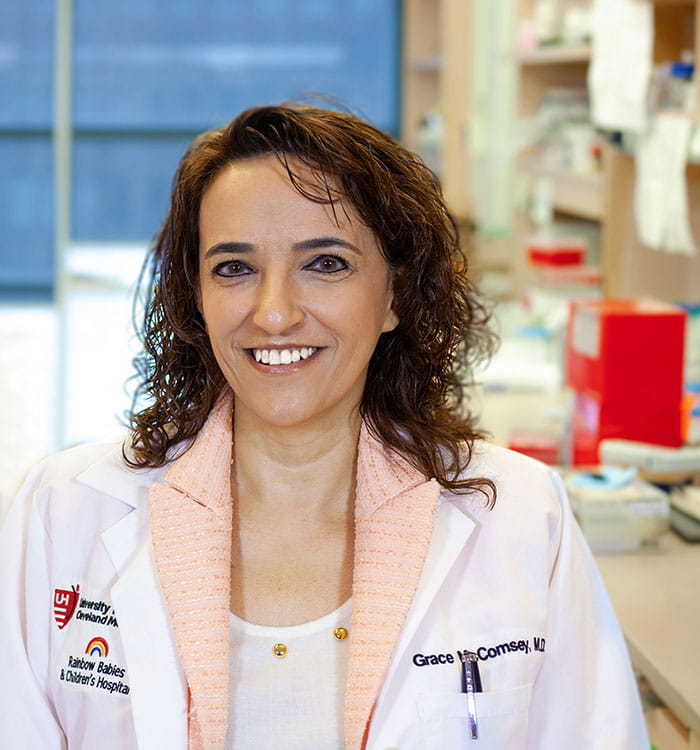UH Rainbow Infectious Disease Specialist Provides National Leadership on Long COVID
June 18, 2023

Grace McComsey, MD, leads one of 15 nationwide RECOVER hubs
Innovations in Pediatrics | Summer 2023
When the National Institutes of Health launched its $1.2 billion RECOVER initiative to study long COVID in early 2021, University Hospitals pediatric and adult infectious disease specialist Grace McComsey, MD, was first out of the gate, enrolling the first patient. She was one of just 15 successful applicants for the federal funding, out of more than 300 who applied.
It’s been full steam ahead since then.
 Grace McComsey, MD
Grace McComsey, MDDr. McComsey, Vice President of Research and Associate Chief Scientific Officer and holder of the Rainbow Babies & Children's Foundation John Kennell Chair of Excellence in Pediatrics, has led UH to the #2 position in the nation in study enrollment among all 15 RECOVER hubs. She also leads the U.S. in pediatric patients enrolled in the first clinical trial of oral Paxlovid for acute COVID. At the same time, she and colleagues in the UH Clinical Research Center have also attacked COVID locally, establishing a biorepository of more than 25,000 specimens that has fueled the more than 200 ongoing studies into different aspects of COVID-19.
“This experience has taught me that however busy you are, there are some challenges and opportunities that should make you stop everything and focus,” Dr. McComsey says.
The Science of RECOVER
As principal investigator for the $20.5 million NEO-CURE study, the Northeast Ohio arm of RECOVER, Dr. McComsey is working to correlate information from patient questionnaires and physical exams with biological samples. One of the main goals is to understand the mechanisms and identify biomarkers that indicate increased risk of long COVID, also known as post-acute sequalae of SARS-CoV-2 infection (PASC).
“We're collecting data and following people for four years after their acute infection, as well as some of them after they had long COVID,” she says. “The idea is to build this huge infrastructure of not only blood and biologic specimens, but a lot of clinical and radiologic data as well, as a central biorepository that will be used by the PIs of RECOVER for a lot of studies. We want to predict who ends up in trouble so that we can aim at preventing PASC during the acute phase.”
Already, Dr. McComsey’s research is yielding some interesting findings. Results show that arterial stiffness appears to be an independent risk factor for the development of PASC, with huge sex differences in arterial stiffness after COVID-19, with women having a much higher arterial stiffness than men after COVID. In addition, her research suggests that gut permeability and oxidized lipids play an important role in the development of PASC.
“More and more data, including data we have, is showing that the gut has a lot to do with PASC,” Dr. McComsey says. “If you take people with PASC, they have increased markers of gut permeability and microbial translocation, whether it's bacterial or fungal. It appears that like HIV, long COVID is turning out to be a gut dysfunction leading to microbial translocation leading to increased systemic inflammation. In a short time, there's a lot that we’ve learned, but there's a lot more to do.”
Moving to Treatment Phase
As co-chair of RECOVER’s Intervention Committee, Dr. McComsey says she’s looking forward to the next few months, when the prevention and treatment phase of the project truly begins. In fact, the 15 PIs of RECOVER successfully lobbied the NIH to get potential treatments to long COVID patients more quickly.
“We're getting started on several protocols that will be up and running,” she says. “Some are antivirals. There is more and more data that the virus seem to be hiding in different reservoirs, whether it's the brain, the gut or different white cells. We're hoping that giving longer duration of antivirals like Paxlovid, for example, for close to a month, will help to eradicate some of that viral reservoir. Some are immunomodulators, which change the immune system pathway that we found is affected in long COVID.”
Dr. McComsey and her fellow RECOVER PIs will also continue to lobby the NIH to provide more resources for patient care coordination and provider education about long COVID. Often, she says, a patient in the NEO-CURE study will have abnormal labs or abnormal imaging that require follow-up, but don’t fall within the confines of the study. At the same time, she says, many of these patients, mostly women, say their providers don’t seem to believe their long COVID symptoms are real and attribute the symptoms to psycho-somatic nature.
“We must do better at educating clinicians, not just the community, but the clinicians, showing that long COVID is real,” she says. “Part of it is dissemination of research findings. Unless you're really embedded into a long COVID clinic, and very in tune with long COVID, you don't know what's happening. Part of the initiative that we're proposing is coordination of care, making sure that everybody, regardless of race and ethnicity has access to care, while educating and building a workforce to help with long COVID recovery. There are almost 2 million people in the U.S. on disability because of long COVID. This is the new face of the pandemic.”
For more information on University Hospitals’ role in RECOVER, please email Peds.Innovations@UHhospitals.org.
Contributing Expert:
Grace McComsey, MD
Vice President of Research and Associate Chief Scientific Officer
University Hospitals
Rainbow Babies & Children's Foundation John Kennell Chair of Excellence in Pediatrics
Professor of Pediatrics
Case Western Reserve University School of Medicine


